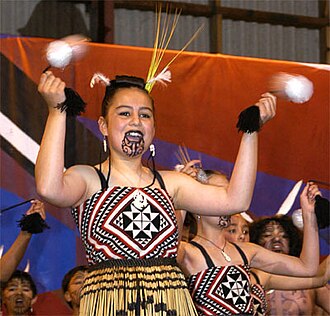AY Honors/Māori Lore/Answer Key
Poi is a form of juggling 'Impartial Art' & (Finnigan, 1992) with balls on ropes, held in the hands and swung in various circular patterns, similar to club-twirling. It was originally practiced by the Māori people of New Zealand (the word poi means "ball" in Māori). Women and men used it to increase flexibility, strength, and coordination. It developed into a traditional performance art practiced mostly by women. This art, in conjunction with others including waiata a ringa, haka and titi torea, make up the performance of kapa haka (Māori culture groups).
Safety
Depending on their construction, poi can strike the user (or bystanders) with enough force to cause bruising or minor injury. Fire poi can cause burns because the metal parts become very hot and have a very high heat transfer coefficient. The actual wick has a lower coefficient and is less likely to cause burns, but it can spray or spread fuel and the performer's clothing can catch fire. Costumes for fire spinning should be made of non-flammable materials, such as cotton and leather. Synthetic fibers tend to melt when they burn and can cause very severe burns.
Fire poi require a safety regime to deal with the risks of setting on fire either the user, bystanders, or the surroundings. All fire performances should have a sober, rested, and alert spotter who has access to a fire extinguisher (for putting out material and fuel fires), a damp towel (for extinguishing burning clothes and for extinguishing fire toys at the end of a performance), and a bucket of water (in case a clothing fire gets out of control). The fuel dump should be a metal container located far from the performance area that can quickly be sealed so as to be airtight. This will provide a means to extinguish a fire in the fuel dump. A paint can is an ideal example.
See also
Notes
- ↑ The evocative term 'Impartial Art' cleverly associates juggling arts with Martial Arts and in poignant point-counterpoint contrasts the inherently non-violent aspect of jugging disciplines.
References
- Finnigan, Dave (1992). The Zen of Juggling. Human Kinetics Europe Ltd. ISBN-10: 0961552158 & ISBN-13: 978-0961552152
External links
- Maori.org.nz Traditional Māori poi performance
- Home of Poi One of the largest and most influential poi communities in the world.
- Spherculism~ Advancing the moving arts
- Tribe.net's Art of Poi Forum, photo gallery, and event calendar.
- Fire Poi World-wide fire poi trainers & performers.
- PlayPoi Poi website featuring videos and photos, both artistic and instructional
- Do More Poi Poi Lessons, Forums, Funkiness.
- Poi Poi Tuition Resource Downloadable Poi lessons, and an active poi community
- Research in New Zealand Performing Arts - a free online research journal that discusses Maori music and related performing arts.
bg:Пой cs:Poi da:Poi de:Poi fr:Poi he:פוי nl:Poi (jongleren) ja:ポイ (ジャグリング) nn:Poi pl:Poi ru:Пои sk:Poi (žonglovanie) sv:Poi

